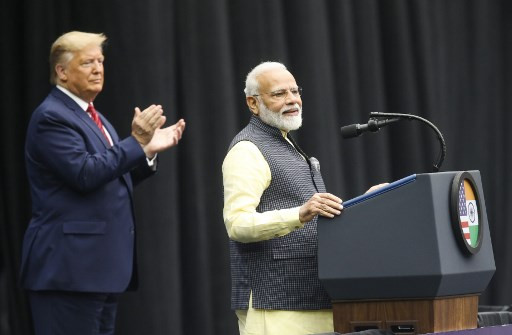Popular Reads
Top Results
Can't find what you're looking for?
View all search resultsPopular Reads
Top Results
Can't find what you're looking for?
View all search resultsCushioning the economy through fiscal spending boost
Fiscal policy can act as a shock absorber to cushion the negative impact of global economic turmoil.
Change text size
Gift Premium Articles
to Anyone
H
eading toward the year 2024, various global economic challenges still linger. Rising inflationary pressures have led central banks to sharply raise interest rates. The tight monetary policy may still persist for a longer period of time. This raises concerns over the risk of lower economic growth projections in some countries, particularly the two largest economies China and the United States. These various global risks may potentially impact Indonesia's economy, especially through the trade and investment channel and financial market volatility.
Indonesia's trade balance has shown a significantly lower performance compared with last year, despite having maintained a surplus for the last 40 consecutive months. During the first eight months of 2023, Indonesia recorded a trade surplus of US$24.3 billion, notably lower than $34.8 billion in the same period last year. Consequently, the current account returned to a deficit of 0.55 percent of GDP in the second quarter, mostly due to the declining trade performance. Recent volatility has also been seen in the financial market. The rupiah exchange rate depreciated as capital outflows drove the 10-year government bond yield to rise due to recent uncertainties regarding the outlook of monetary policies implemented by major central banks.
Seeing these developments throughout the year, the International Monetary Fund (IMF) has revised Indonesia's economic growth projection for 2024 slightly downward from the previous 5.1 percent to 5 percent. Entering the year 2024, the risks to Indonesia’s economy are relatively balanced. The risk of a prolonged global slowdown may weigh on Indonesia’s external performance. Yet, there are expectations of a potential interest rate cut, which may cushion the slowdown. Amid the domestic factors, Indonesia will also hold national elections in the beginning of the year, which may partly positively impact the economy through higher consumer spending. Yet note that the period of political uncertainties ahead of the election usually has a negative impact on economic expansion.
On a positive note, Indonesia's economy will still largely be driven by domestic resilience, specifically from household and government spending. However, during election years, political uncertainty has often impacted economic performance. Historically, GDP tends to grow softer in the year when an election is held. This is mostly driven by slower growth in investment as economic actors tend to hold expansion plans and take a wait-and-see approach, waiting for the election result, the new government structure and the policy direction that follows. Nonetheless, we expect the negative impact can still be offset by resilient household spending, which contributes more than half of Indonesian GDP and which tends to grow faster during election years. This positive prospect of household spending can be further supported by the stimulus from fiscal policy.
Fiscal policy can act as a shock absorber to cushion the negative impact of global economic turmoil. Government spending in 2024 is projected to grow relatively high, supported by the notably higher election spending this year. The scale of the elections in 2024 is significantly wider with both the national and local elections taking place simultaneously. Election spending for the year 2023-2024 is expected to reach Rp 37.4 trillion ($195 billion), higher than the previous election in 2019 at Rp 30.4 trillion. This can provide a substantial boost to consumption growth, especially for the Non-Profit Institutions Servings Households growth.
Besides election spending, several other types of state spending are also targeted to be higher in 2024 than in 2023. One of the most significant growths in government spending is on salaries and pensions, which are expected to increase significantly by 11.3 percent in 2024, from Rp 432 trillion ($28.1 billion) to Rp 481.4 trillion. This is due to the government’s plan to increase the salaries for civil servants (PNS), the Indonesian Military (TNI), and the police, which are set to increase by 8 percent, and pension payments, which will increase by 12 percent. This higher spending can give an additional significant boost to consumer spending, which can also have a multiplier effect on the economy.
In addition, in supporting vulnerable groups or lower middle-class households, government spending for social assistance and subsidies is set to be higher than in 2023. Subsidies are allocated to reach Rp 282.7 trillion, increasing by 4.2 percent, while social assistance is allocated to reach Rp 252.8 trillion, or 6.2 percent higher than 2023. The subsidies budget is allocated to lighten the burden on society and ensure that producers are able to produce goods and services, especially those that constitute society's basic needs.
Another thing to note is that government subsidies in election years are usually realized faster than in the years without an election. Hence, we believe that these factors could largely contribute to the robust growth in household spending, which will further keep Indonesia's GDP growth steady in the year of the election.
On the other hand, there are other factors that can support robust household spending in 2024. In 2024, the inflation target is expected to decrease from 3 ± 1 percent in 2023 to 2.5 ± 1 percent in 2024. If the government can efficiently control the inflation rate by maintaining the prices of goods that contribute significantly to inflation, such as food and energy, it will have a positive impact on households in the form of maintaining people's purchasing power. Nonetheless, we should be cautious about the risk of a prolonged El Nino, which could have an impact on increasing food prices if stocks are inadequate. The geo-political dynamic has also recently led to rising oil prices and food export bans from some food-producing countries. If we are not careful, this may also impact the inflation rate.
In conclusion, faster fiscal spending is very much needed as this will largely support Indonesia's economy in 2024 amid rising global challenges. Fiscal spending can act as a shock absorber, as it can boost consumer spending, cushioning the economy from the negative impact arising from the global economic risks going forward.
***
The writer is a junior economist at Bank Mandiri.











